Volume 32
Displaying 1-28 of 28 articles from this issue
- |<
- <
- 1
- >
- >|
Research
-
2023Volume 32 Pages 1-8
Published: 2023
Released on J-STAGE: March 31, 2023
Download PDF (869K) -
2023Volume 32 Pages 9-17
Published: 2023
Released on J-STAGE: March 31, 2023
Download PDF (1521K) -
2023Volume 32 Pages 18-25
Published: 2023
Released on J-STAGE: March 31, 2023
Download PDF (780K) -
2023Volume 32 Pages 26-34
Published: 2023
Released on J-STAGE: March 31, 2023
Download PDF (739K) -
2023Volume 32 Pages 35-43
Published: 2023
Released on J-STAGE: March 31, 2023
Download PDF (753K) -
2023Volume 32 Pages 92-99
Published: 2023
Released on J-STAGE: July 31, 2023
Download PDF (855K) -
2023Volume 32 Pages 125-133
Published: 2023
Released on J-STAGE: July 31, 2023
Download PDF (1159K) -
2023Volume 32 Pages 143-149
Published: 2023
Released on J-STAGE: July 31, 2023
Download PDF (707K) -
2023Volume 32 Pages 150-158
Published: 2023
Released on J-STAGE: July 31, 2023
Download PDF (834K) -
2023Volume 32 Pages 159-167
Published: 2023
Released on J-STAGE: July 31, 2023
Download PDF (878K) -
2023Volume 32 Pages 177-184
Published: 2023
Released on J-STAGE: November 30, 2023
Download PDF (620K) -
2023Volume 32 Pages 185-193
Published: 2023
Released on J-STAGE: November 30, 2023
Download PDF (848K)
Clinical Report
-
2023Volume 32 Pages 44-50
Published: 2023
Released on J-STAGE: March 31, 2023
Download PDF (808K) -
2023Volume 32 Pages 51-58
Published: 2023
Released on J-STAGE: March 31, 2023
Download PDF (815K) -
2023Volume 32 Pages 134-142
Published: 2023
Released on J-STAGE: July 31, 2023
Download PDF (803K)
Material
-
2023Volume 32 Pages 59-65
Published: 2023
Released on J-STAGE: March 31, 2023
Download PDF (720K) -
2023Volume 32 Pages 66-75
Published: 2023
Released on J-STAGE: March 31, 2023
Download PDF (1010K) -
2023Volume 32 Pages 76-83
Published: 2023
Released on J-STAGE: July 31, 2023
Download PDF (952K) -
2023Volume 32 Pages 84-91
Published: 2023
Released on J-STAGE: July 31, 2023
Download PDF (813K) -
2023Volume 32 Pages 100-107
Published: 2023
Released on J-STAGE: July 31, 2023
Download PDF (770K) -
2023Volume 32 Pages 108-115
Published: 2023
Released on J-STAGE: July 31, 2023
Download PDF (817K) -
2023Volume 32 Pages 116-124
Published: 2023
Released on J-STAGE: July 31, 2023
Download PDF (761K) -
2023Volume 32 Pages 168-176
Published: 2023
Released on J-STAGE: July 31, 2023
Download PDF (797K) -
2023Volume 32 Pages 194-202
Published: 2023
Released on J-STAGE: November 30, 2023
Download PDF (988K) -
2023Volume 32 Pages 203-212
Published: 2023
Released on J-STAGE: November 30, 2023
Download PDF (1207K) -
2023Volume 32 Pages 213-222
Published: 2023
Released on J-STAGE: November 30, 2023
Download PDF (620K) -
2023Volume 32 Pages 223-230
Published: 2023
Released on J-STAGE: November 30, 2023
Download PDF (736K) -
2023Volume 32 Pages 231-238
Published: 2023
Released on J-STAGE: November 30, 2023
Download PDF (728K)
- |<
- <
- 1
- >
- >|
